Home > Articles > The Archives > Charlie Moore
Charlie Moore
Reprinted From Bluegrass Unlimited Magazine
January 1973, Volume 7, Number 7
Among the people who have given bluegrass music some of its important milestones, Charlie Moore ranks among the pioneers. Though North Carolina has produced a number of the giants among bluegrass, South Carolina also had its share including Don Reno and Charlie Moore. Statistics: born- February 13, 1935, Piedmont, South Carolina. Occupations: cotton mill worker, radio D-J and program director and first and foremost, bluegrass musician. “That’s all I ever really wanted to play. I met Henry Dockery’s cousin Clarence Dockery who played the five string banjo and Clarence and I played some together. Actually Ansel Guthrie, Thomas Williams and myself had been playing the same music without a banjo when I was in high school. After I got that first banjo player I’ve had one ever since. Around 1953 I finished high school and went to work in a cotton mill. I quit the cotton mill after about three years when I decided there must be something easier than that.”
Charlie left for Florida to find a playing job. There he met Glenn Reeves who is now Director of the Jamboree in Wheeling, West Virginia. Glenn was a disc-jockey at the time and gave the encouragement that Charlie needed to think seriously about making music his career. “Glenn said to get your banjo player and come back and we could probably find some work around Jacksonville. Well I came back and couldn’t find the banjo player and didn’t return to Florida.” However the seed had been planted. “I had been at the TV studio in Asheville, North Carolina where Cousin Wilbur (Westbrook) had a daily TV show from 12 to 1 each day jamming with Wilbur’s band at that time which included Buck Trent, Chubby Anthony, and Ronnie Blackwell. Cousin Wilbur had heard me I guess.” Cousin Wilbur was an early member of Bill Monroe’s Blue Grass Boys. “Red Smiley had been working for Wilbur around that time and had left with Don (Reno) to go to Richmond, Virginia. One day the biggest portion of the band walked out. Well when I got back to Piedmont from Florida I found out that Cousin Wilbur had the law out looking for me to come to work for him. When I went down to Asheville to work they just had an electric guitar and a steel player and him. Wilbur had suggested that I should get a job with Bill Monroe but I just never followed it up. After I went with Wilbur in Asheville he advertised on TV for a banjo player and Kent Wiseman came up and went on with the show and worked about a year. After a while Chubby Anthony came back with us.”
Charlie had an offer from the local radio station in Belton, South Carolina near Piedmont, to return and go to work as a DJ though Charlie had never done that type of work before. “The station wanted me to cut an audition tape and I went to a station in Marshall, North Carolina and made one. I introduced the records and gave the commercials but the fellow who worked for the station actually played the records — I had never operated the control board before. I got the job and when I went to work they took me right into the control room and sat me down at the board and must have thought I could run one of those things. I never had told them and they never asked. We got over that slight problem with a few shaky hours practice.”
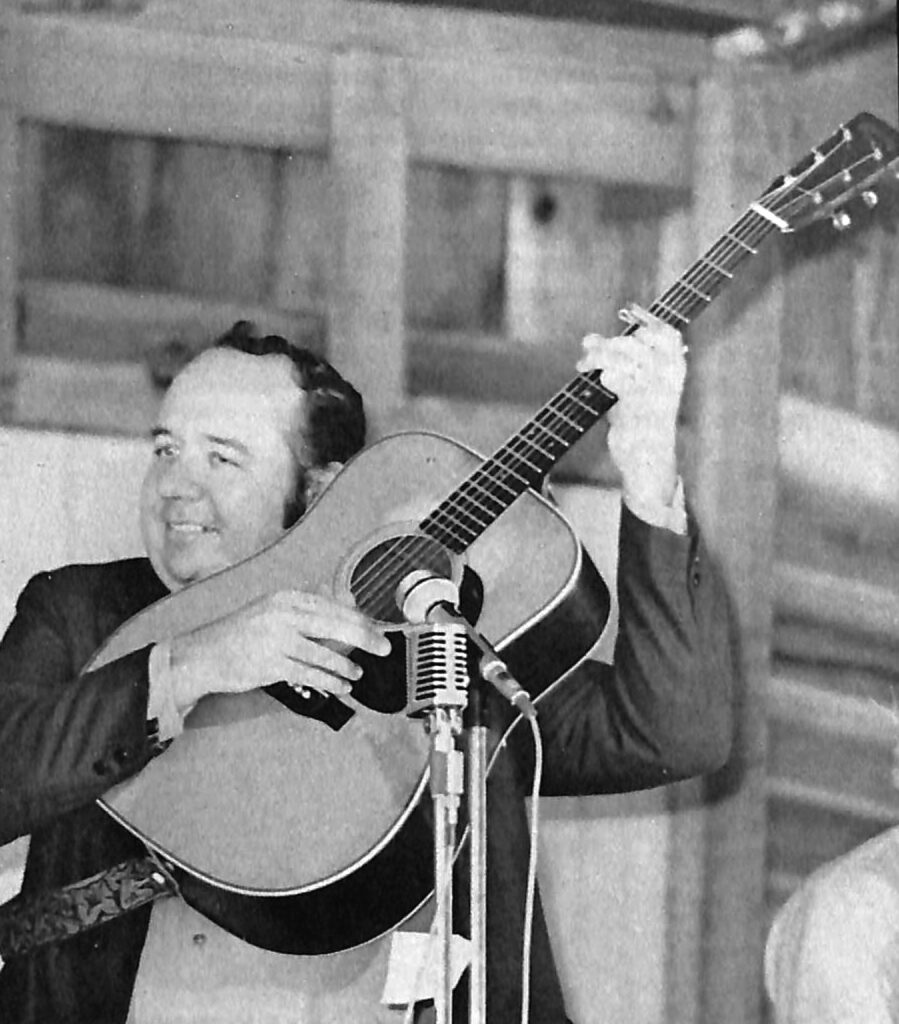
It was during his stay with the station as an announcer that he organized the Dixie Partners. He wanted to be back playing music, too. “We went to work on the TV station in Greenville, South Carolina on what they used to call The Carolina Promenade Party and then we got our own show on WSPA in Spartanburg. This was in 1957. The first record that we made for Starday was recorded in the TV studio in Greenville. Our show in Spartanburg was on Sunday afternoon.”
At that time the band consisted of Ansel Guthrie, Dick Sisk, Curly Ellis, Bobby Ellis and Charlie. “We did real well on that TV spot. It was an all gospel show but they still wanted us to wear hats and all. We had two sponsors who were really pleased with the show. One was a sausage company and the other was a tombstone company. They wanted to move the show to Saturday evenings at 6 o’clock and I was still holding down my job at the radio station. Back at that time we were the only group in the area with a TV show.”
Charlie is one of the few younger musicians who plays guitar with a thumb and finger pick. This style is used among the more traditional groups but has largely been abandoned in favor of the flat pick. “My daddy used to play a guitar with a thumb and three fingers-the old time way. But I had seen some people playing just using the thumb and one finger pick and just thought I would do it that way. I also found I could play faster using that method plus I was always dropping a flat pick. Probably the first guy I ever saw playing with a thumb and finger pick was Carl Story. After him I guess that I saw Lester Flatt and Carter (Stanley) and Clyde Moody, too.”
Carl Story was also instrumental in getting some wide exposure for this new group by getting them guest spots on the Tennessee Barn Dance from Knoxville, Tennessee. Charlie also booked some of the bluegrass acts around the area of his popularity, and worked combined shows. He was one of the first people to seek out specifically bluegrass talent and book shows for them. “I guess some of the first shows that Carter and Ralph Stanley ever played in South Carolina I had booked the dates.”
As a band The Dixie Partners continued to appear on TV in and around Greenville and Spartanburg. Since Charlie was a DJ during the week the traveling that they were able to do was limited to that local area. Music did finally get the upper hand and Charlie gave his notice to the radio station of his intention to leave. “The TV station in Spartanburg liked our show so much that they wanted us to do a TV show every morning so I quit radio and just played the TV show and dates around the area. We had been on TV about two or three months and Curly Ellis thought he was going to be drafted and quit. That was the time that I got Kent Wiseman to come work with me.” Kent Wiseman was killed in car wreck and a memorial park dedicated in his name at his home place near Spruce Pine, North Carolina is the site of a very successful bluegrass festival held the last week in August. The area is close to the Brown Mountain Light whose mysterious appearances were the basis for a number of scientific investigations as well as the idea prompting Scotty Wiseman to compose the composition of the same name. “It was while Kent was with us that Bill Napier and I got together.”
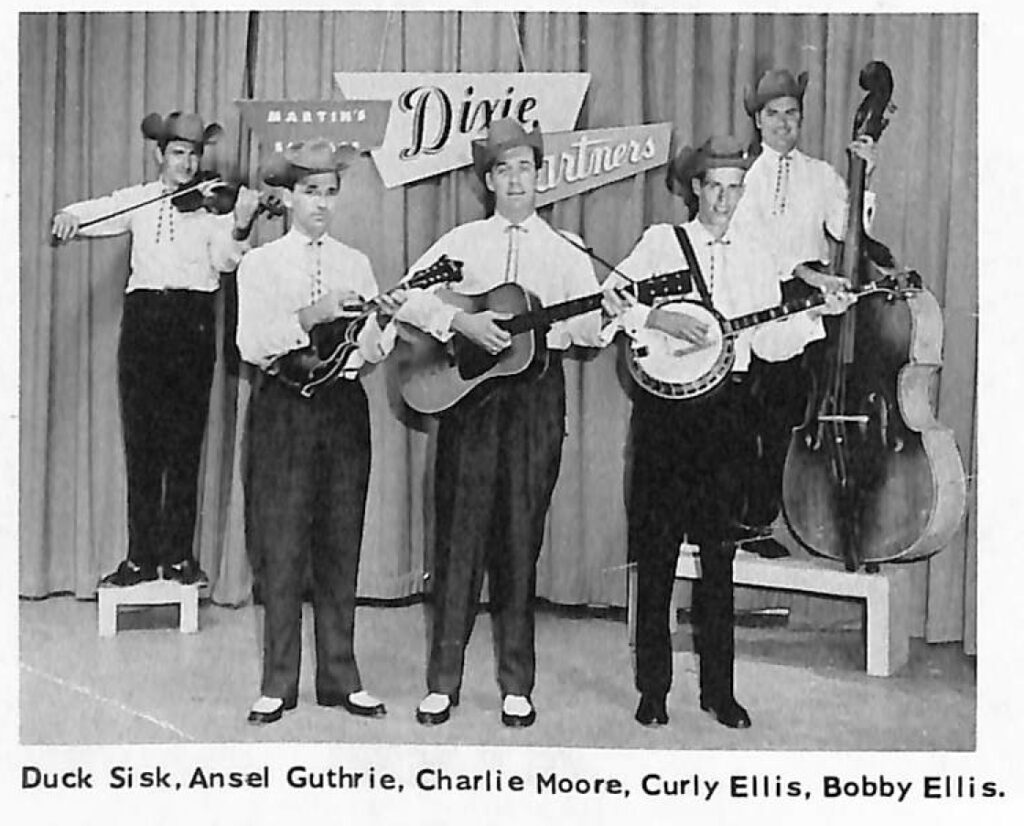
Bill Napier, who was Charlie Moore’s partner for almost five years, was playing mandolin and guitar for the Stanley Brothers at the time. Charlie and the Stanley Brothers were to trade a number of musicians back and forth over the next few years. Bill Napier, while working for the Stanley Brothers recorded and composed one of the few mandolin instrumentals other than Bill Monroe’s that have been carried into tradition, Daybreak in Dixie. Bill also was one of the first to introduce the flat picking guitar style that became the Stanley Brothers’ trademark in later years. “We had worked a date with the Stanley Brothers in Swainsboro, Georgia and Bill called me the next week and said he wanted to leave Ralph and Carter. How Far to Little Rock had just been released and it was the hottest thing going at the time. They (Stanley Brothers) had Bill Napier and Chubby Anthony with them then and we were carrying four or five members. But when Bill called me, I told him to come on up and we would work him in someway. When he got there he had Chubby Anthony with him too but we couldn’t use both of them. Chubby went on to Boston and worked with the Lilly Brothers and Don Stover. This was around 1959 or 1960 I guess. Bill was playing guitar and doing this old man comedy act that he used to do. We left Spartanburg and went back to Greenville for Jim Walter Homes on Saturday afternoon. We had a real good spot on TV then. The Florida Boys Quartet came on just before us. Their show was on tape and then we did ours live, and immediately following us was Lester Flatt and Earl Scruggs. Jim Walter closed their office in Greenville so we lost our sponsor but the TV station asked us to stay on. We were there for about a year after that before we went to Florida.”
The man who had been the sales manager and the station in Spartanburg had obtained the job of station manager at the station in Panama City, Florida WJHG-TV and remembered the success that he had with the group before. “He called us time and time again and then we wrote and then he would call again. He said that we could do real good on dates down in that part of the country since there was nobody playing in that area. Jim and Jesse were playing in Dothan, Alabama but that was over a hundred miles away. He told us he would put us on every day. Well we decided to go down and two days later, after Bill had worked in the back room trying to get a lick going on the banjo, we went on with a TV show every day and with a Saturday evening show, too.” Panama City for those who don’t have a map handy is along the northwestern part of Florida on the Gulf of Mexico. Not exactly a prime area for bluegrass music at the time. The dates that were promised were long in coming and usually caused a lot of driving to get to them. “What the guy didn’t tell us about the dates and all this wonderful TV coverage was that half of the TV signal was going out in the Gulf of Mexico and the other half was covering the alligators over in the swamps. There just weren’t hardly any people. You had to leave and go at least fifty miles to find anyplace to play. We worked there about a year I guess. During that time we also went to work one night a week on the station in Pensacola, Florida. We played some good dates in that area and up through the lower portion of Alabama.”
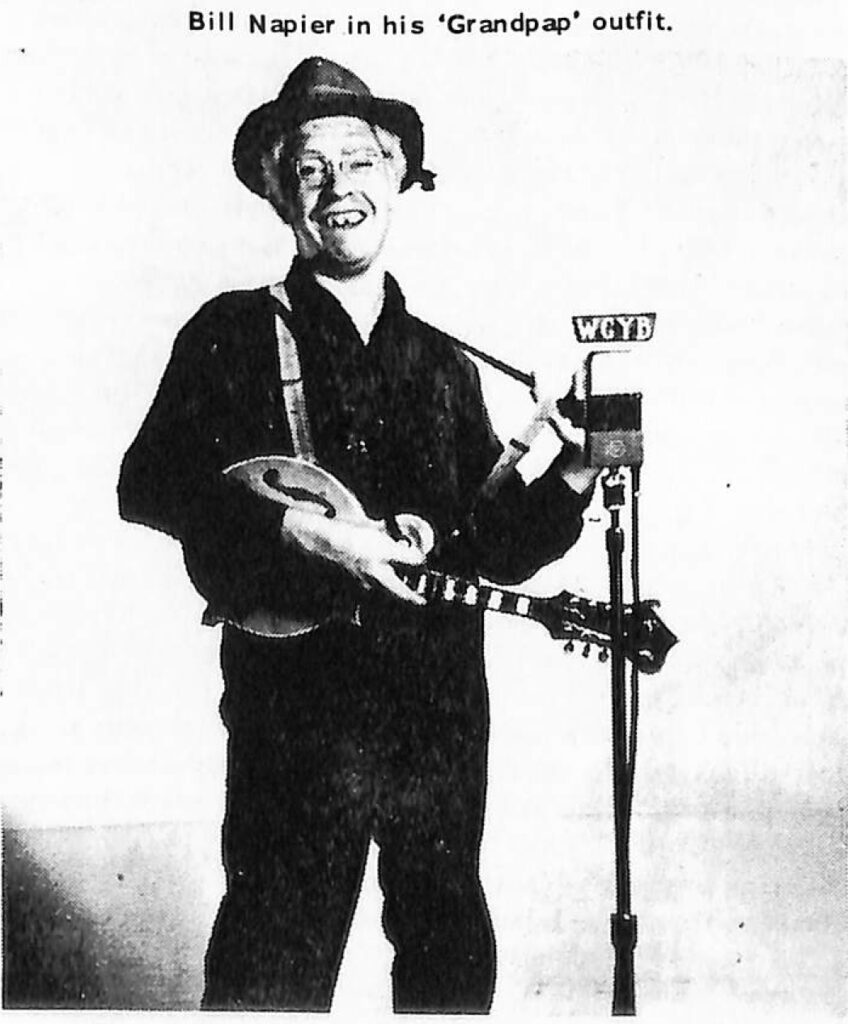
Henry Dockery had left the group and gone to work for a while with the Stanley Brothers. Curly Lambert who also played with the Stanley Brothers came down from Virginia to take Flenry’s place playing bass or mandolin. Ralph Mayo who also was a former Clinch Mountain Boy and had played with the group in Panama City. Curly Lambert left the Dixie Partners to return with the Stanley Brothers playing lead guitar which was the instrument he wanted to play and Henry Dockery returned to play bass with the Dixie Partners. Jim Williams who worked with a number of groups during the early 1950’s including Mac Wiseman’s Country Boys and the Clinch Mountain Boys of the Stanley Brothers was lured back into playing with the group at this time. “Jim was a Holiness preacher then and I called him to see if he would come back and play and he agreed.
“This was the group that recorded our first record for King. Bill and I and Jim Williams and Henry Dockery and Ray Pennington on drums. Later on during the time we were at Panama City we had three brothers who worked with us. They played fiddle, mandolin and Dobro but since we had never used a Dobro I got the Dobro player to switch over to bass.
“On the TV show in Panama City I had to read the farm news plus headlines and do a weather forecast with the weather map and everything. We had managed to line up shows on TV in Panama City, Orlando and Pensacola. We lost the TV show in Pensacola and that was when we decided to come back to Spartanburg. Since the three brothers didn’t want to leave I called Duck Sisk and Frank Buchanan and they worked with us for a while. We never left the Greenville-Spartanburg area after that for any length of time.”
Don Reno, after leaving the Roanoke area around 1965, returned to Spartanburg and worked a TV show for about a year. Don left and Charlie and Bill took over the early morning television show for another year after Don’s departure. Charlie was working as a DJ as well as the early morning TV show plus the Jamboree in Wheeling, West Virginia and road dates as they came up. Needless to say, the group was busy. “At that time we had Johnny Dacus with us on fiddle and Eb Coll Collins also worked some with us on fiddle and mandolin.
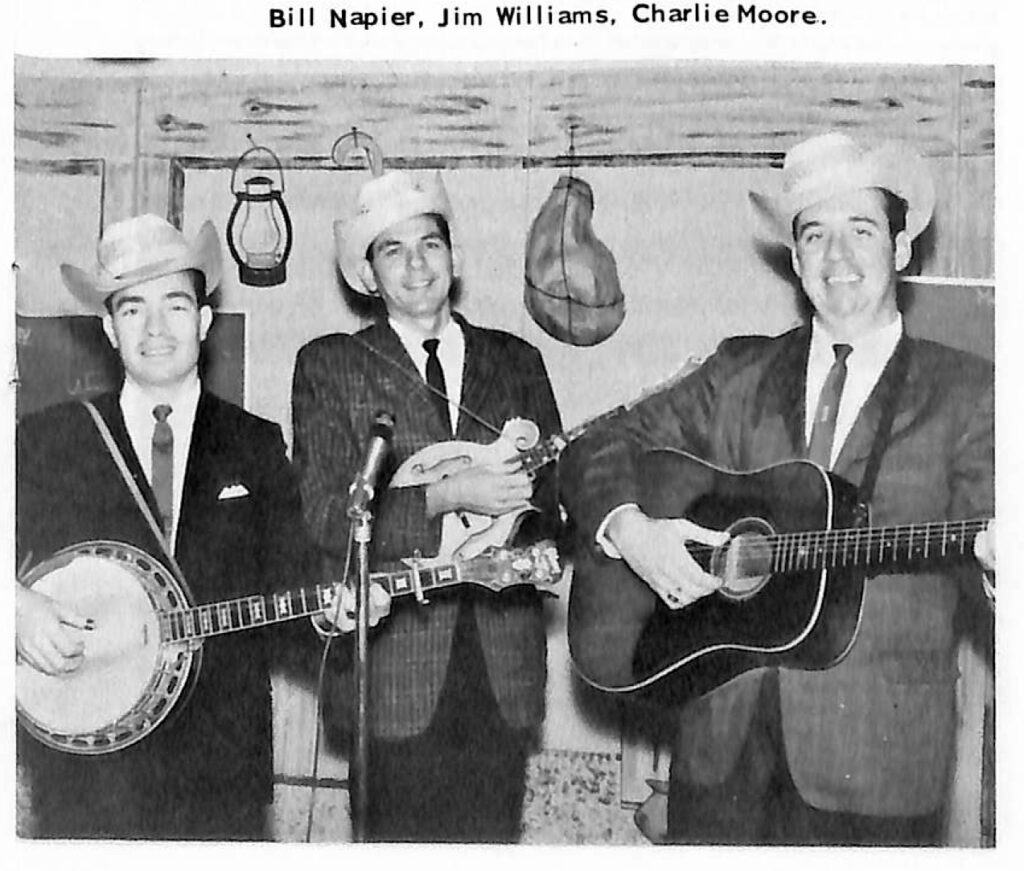
We got Chubby Anthony to play with us again and he was working with us until Bill and I split up. We had met Paul (Moon) Mullins who was working for a station in Middletown, Ohio and he did a lot of recording with us. I played out the dates that we had contracts on and then went back to full time DJ work in 1967. At first I was playing pop music on a station in Fountain Inn, South Carolina. But I did talk them into converting to a country station before I left. Some friends of mine had bought the station in Belton and they wanted me to come to work as program director so I made the move back. I was still playing some on the side and gradually eased back into playing again. At first I had Ansel Guthrie and Curly Ellis with me but they don’t like to travel. Butch Robbins was stationed in the Army in South Carolina so I got Butch to work with us and then got Larry Jefferson on mandolin and Henry Dockery has been with us on bass. For a while we had Terry Baucom on fiddle but I talked Johnny Dacus back into working and that is the group now. We are working the Jamboree in Wheeling about once a month and getting quite a few shows throughout the east. We just recently recorded with Starday-King in Nashville and re-cut our old Truck Driver’s Queen for them which Jimmy Martin has as his latest release, too. We were quite pleased also with the response we have received on the Legend of the Rebel Soldier. I got the basic idea from an old cut that Mac Wiseman had made of the Irish Rebel a number of years ago and just converted the setting to the south. I am quite happy that so many groups are doing it.”
Charlie is an overly friendly musician and has always tried to accommodate any requests that have been made of him. A thorough professional, he is an excellent spokesman, both as an entertainer and as an MC, for bluegrass music.
Share this article
1 Comment
Leave a Comment Cancel Reply
This site uses Akismet to reduce spam. Learn how your comment data is processed.
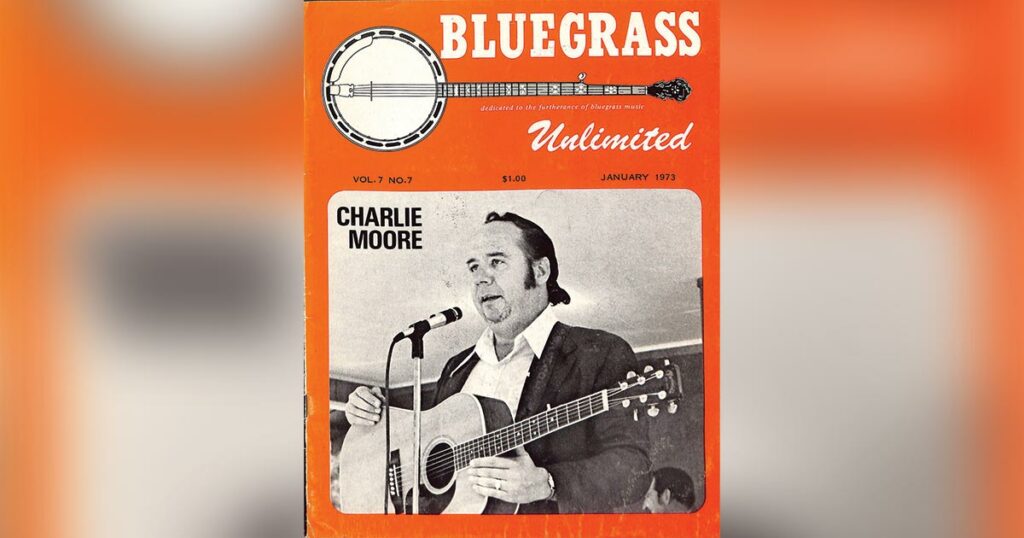
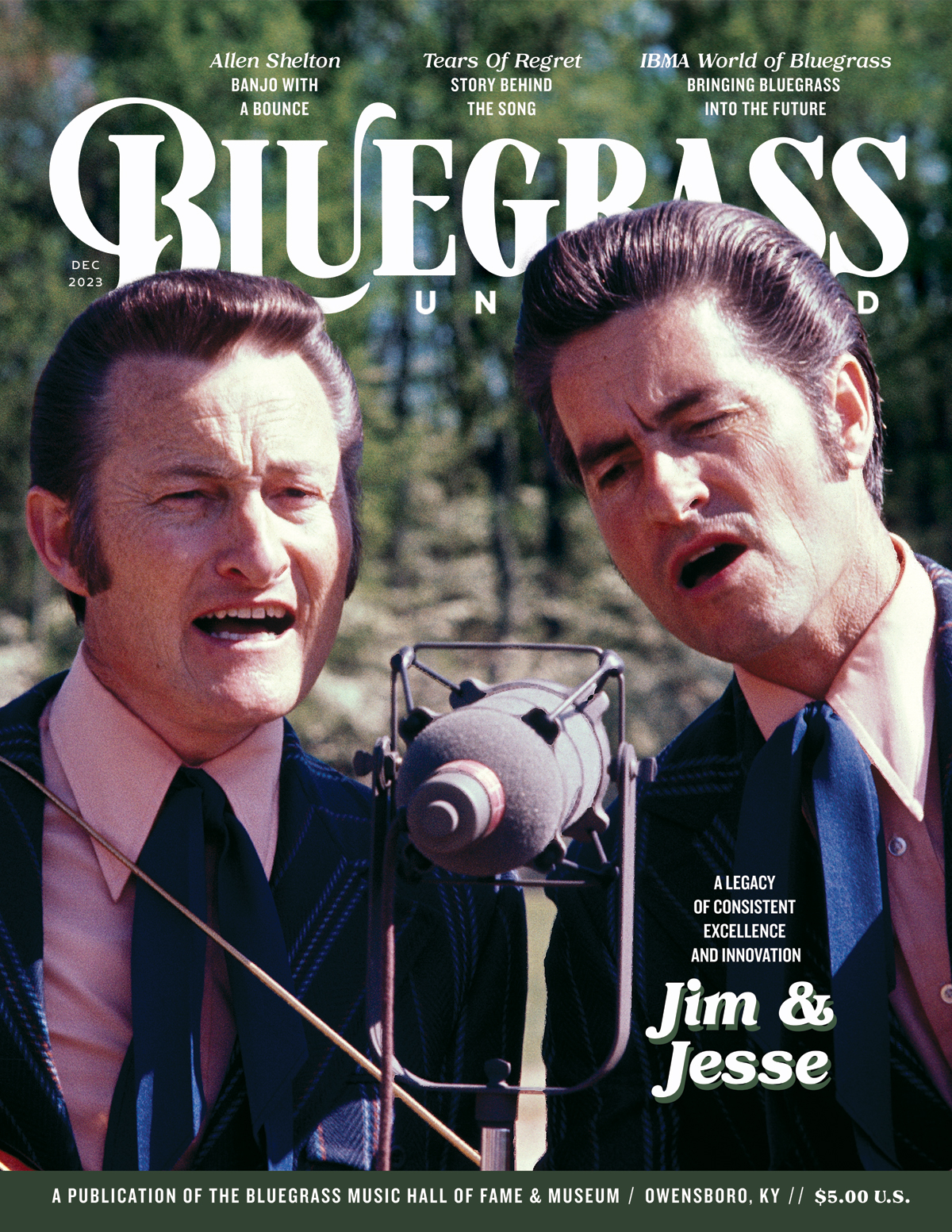
Charlie Moore is the most underrated bluegrass singer, songwriter, picker! I loved to hear him sing and pick. He did 3 finger style. I traveled with Charlie from 76-79. And I tell ya, I loved every second with my time with him. Love ya Chase!!